A few years ago when this picture hit the internet, everyone who logged on collectively ooh’d, ahhh’d and swooned.
Most of us didn’t feel all soft and fuzzy simply because of an image of a daddy combing a daughter’s hair. For many, the hormonal surge of happy-place emotions was amplified because it was a White dad combing his Black daughter’s natural hair. This was particularly interesting to many because our society has essentially deemed Black hair as “off limits” in both personal and public spaces.
For one thing, many professional Black women are racially discriminated against and not allowed to wear ethnically Black hair in the workplace. Many Black children are forced to submit to racist policies and repeatedly told they need to straighten their hair in order to be allowed into public schools. Even a number of Black college students are told that they are not allowed to wear ethnically Black hair if they want to be accepted in certain academic programs (hey Hampton U!).
The idea of a non-Black person combing a Black child’s hair was enticing to many. But the idea of a White father combing his Black child’s hair took it one step further and set the internet ablaze.
That said, I (naively) expected a similar “look-at-how-awesome-it-is-when-dad’s-comb-their-daughter’s-hair” response when this next picture went viral.
The picture depicts Doyin Richards, blogger at daddydoinwork.com, combing his daughter’s hair while wearing his baby. And yes, it made my heart melt. Maybe its because it reminded me of my husband playing with our daughter while getting our son ready. Maybe it was due to my own memories of my father staring in awe as my mom combed my hair as a child.
But whatever it was about this second image that made me get all misty eyed and happy was clearly not shared by everyone. Sure, some of us did the happy dance at an image of Black fatherhood. But many who saw this image did a double take and got all racially-hatred-and-stereotypically-racist.
According to Richards, here are a few of the more sinister responses he got to his picture:
– “He probably rented those kids. They don’t even look like him.”
– “I would bet anything that you’re a deadbeat.”
– “OK buddy, cute picture. Now why don’t you hand the children back to their mom so you can go back to selling drugs or your bootleg rap CDs?”
– “So do you do this for all of your illegitimate kids?”
– “This would be so much better if those kids were BLACK!”
See the difference?
White father combs hair and the love fest begins. White father is appreciated for doing work traditionally assigned to the mommy side of the parenting work divide. But White father is also applauded for crossing a racial divide and not just doing hair—but doing a Black girl’s hair.
Black father combs hair and the haters show up.
Black father is ridiculed for being illegitimate and only pretending to be a father. Black father is attacked with stereotypes and told that these can’t possibly be his real kids or he must have a bunch of other kids he is not parenting. And despite the fact that he is sharing such an intimate family picture on a blog dedicated to being a good father, that he must be engaged in unlawful activities which would detract from his ability to be a good father in the first place.
The different reactions are indicative of the racially skewed ways in which we view fatherhood and who can be a father.
Which makes sense considering that throughout the several centuries of slavery, Black parents were prohibited from the act of parenting their children. By definition an enslaved Black parent could not exercise autonomy over his or her own body—let alone fight for his or her children.
The enslaved Black parent’s reality was defined in part by the slave master’s ability to start or end any day with the news that his or her children were going to be tortured for an infraction or sold away.
After slavery there were decades of social policies put in place that negatively impacted the structure and development of Black family life. Many programs were predicated on the notion that Black families could only receive assistance if there was no man staying in the home. Social service benefits and programs like welfare and food stamps were often conditioned on Black men being absent from the roles of parent and spouse.
If a man were suspected of being in the household, the entire family could lose access to desperately needed social services like housing, food stamps and health care.
Institutionalized racism ensured that Black men would be barred from many jobs. Which meant that Black women were often forced into service positions that allowed them to be primary (if not the sole) breadwinners. This economic disparity often reinforced the notion that Black men had no real ability to contribute to the home and family structure.
Collectively, society’s view of Black men devolved to a commonly held opinion that Black men can’t father, won’t father and don’t father their children. And they most certainly don’t comb their daughter’s hair.
These commonly held erroneous beliefs are part of the reason why many find it so hard to believe studies like the “federal survey of American parents [that] shows that by most measures, black fathers who live with their children are just as involved as other dads who live with their kids — or more so.”
According to Clutchmagonline.com, the study revealed that
[B]lack fathers are more active in their children’s lives than any other race. Out of the [B]lack fathers who live with their children, 75% of [B]lack fathers compared to 60% white and 45% Latino would help with tasks such as bathing and diapering. The study, which involved 3,900 men between 2006 and 2010, also showed that 35% of [B]lack fathers who lived with their young children said they read to them daily, compared with 30% of white dads and 22% of Latino dads. It wasn’t just the fathers living with their children who proved to take an active role in the child’s lives, but also those fathers who weren’t in the house. Black dads who lived outside of the house were at least as involved as other dads who didn’t live with their kids, or more so.
This study reinforced my own reality. Though my parents divorced when I was young, my father found ways to stay involved in our lives and to parent us even from a distance. The fathers in my predominantly Black community today are the wake up the babies in the morning, get them breakfast, pick them up after school kind of Black fathers. The kind of Black fathers whose kids challenge them in a chess match or crawl into their laps for stories at bed time. The kind of Black fathers who know what it is to giggle over a hilarious Doc McStuffins or Backyardigans episode.
The kind of Black fathers who wear their babies and comb their daughter’s hair. The kind who blog about being good fathers while actually being good fathers.
These are the images of fatherhood that we need more exposure to because these are the images that reflect the other side of the story. The side of the story where being a Black man and a good father are not two mutually exclusive roles.
And if you’re looking for more thoughts from an Afro State of Mind, check out my book “Afro State of Mind: Memories of a Nappy Headed Black Girl now available on Amazon.com in paper back or e-book! And if you want to stay connected follow me on Twitter, “like” Afro State of Mind on Facebook or catch up on my latest youtube videos! Don’t forget to check out Afro State of Mind Radio, Sunday mornings at 10 am on iArtistRadio.com – this week we continue our month long spotlight on Black health. Enjoy!
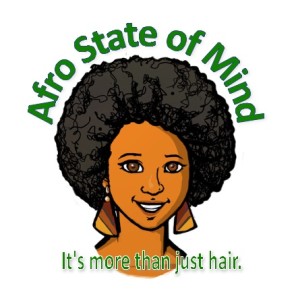
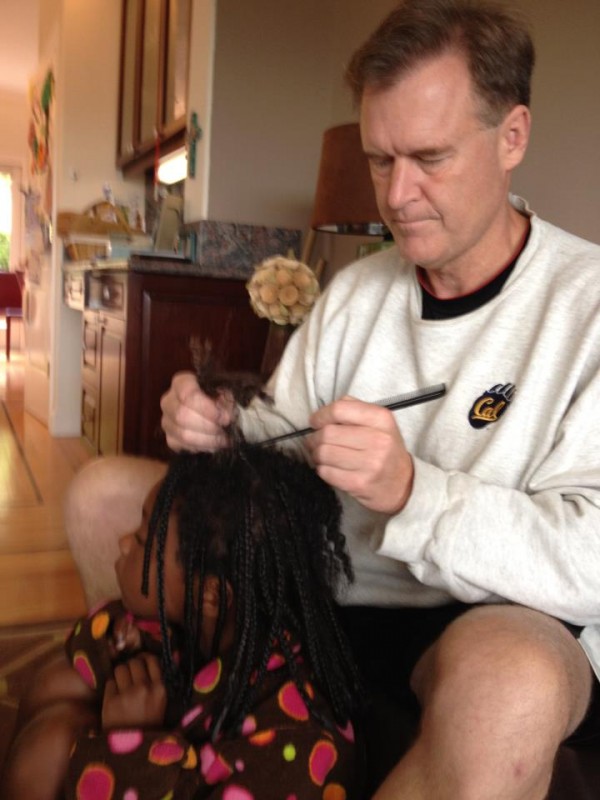
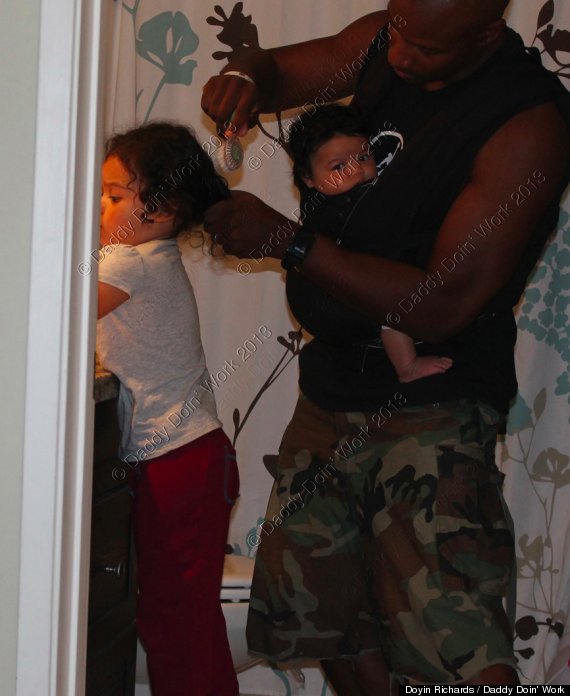
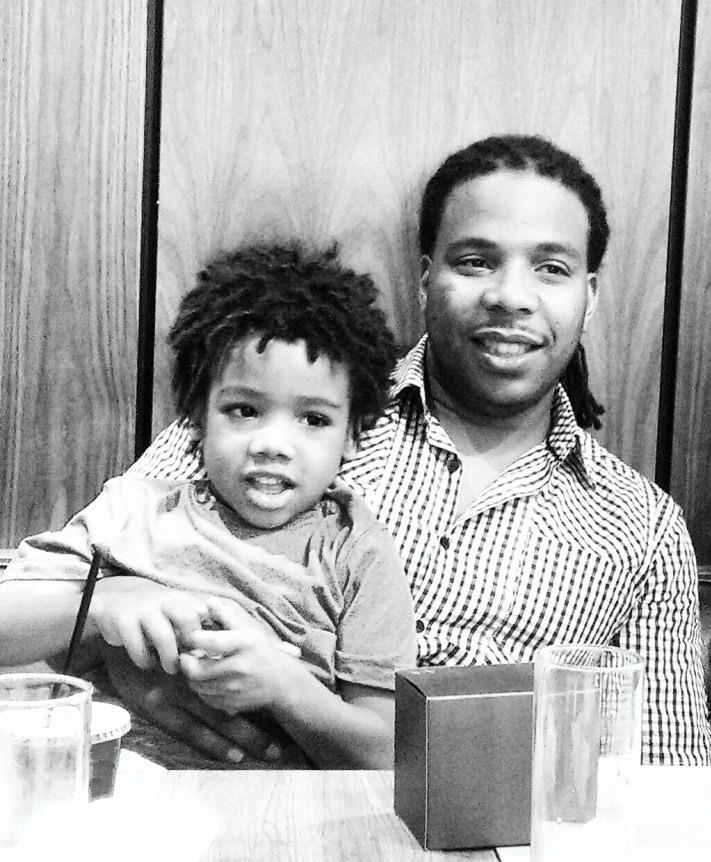


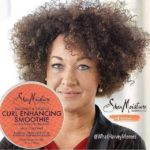
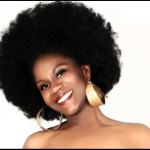
My son is 23 yrs old and he fathered a child out of wedlock. From the moment he learned of the pregnancy he made it his priority to be active in the child’s life. He has stepped up to be a father to his child; as well as, the mother’s other child. He has paid a price to be actively involved and present in these boys lives. He’s never had his biological father; therefore, has chosen to break the cruse. Many men would have just ran away but he’s chosen to stay. There are many great black dads and he’s one of them. For that I am a proud GiGi. Children need both parents and I truly think the black race is coming to understand this. Our children deserve both parents.
That is WONDERFUL and I thank you for sharing! Kudos to your son for making the right choices.